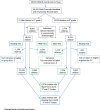Sixth grade academic achievement among children conceived with IVF: a population-based study in Texas, USA
- PMID: 33797677
- PMCID: PMC8266932
- DOI: 10.1007/s10815-021-02170-9
Sixth grade academic achievement among children conceived with IVF: a population-based study in Texas, USA
Abstract
Purpose: To compare academic achievement in reading and mathematics at the end of sixth grade and progress from third to sixth grade by children conceived with in vitro fertilization (IVF) to those conceived naturally.
Methods: This was a retrospective population-based cohort study of IVF-conceived singleton and twin children who took the 3rd grade and 6th grade public school standardized reading and mathematics testing in Texas.
Results: There were 6623 children with reading scores in both the third and sixth grades and 6374 children with mathematics scores in both the third and sixth grades. Mean (± SE) scaled test scores for IVF and control singleton children for reading were 1544.6 ± 3.4 and 1527.7 ± 1.9, respectively, in third grade and 1701.2 ± 3.6 and 1681.0 ± 2.0, respectively, in sixth grade; for mathematics, the scores were 1564.4 ± 3.7 and 1548.9 ± 2.1, respectively, in third grade and 1774.0 ± 4.2 and 1752.0 ± 2.3, respectively, in sixth grade. In multivariate models, singleton IVF children scored significantly higher than control children in reading and mathematics, averaging 17.7 ± 4.0 points and 20.1 ± 4.1 points higher, respectively, in reading in third and sixth grades and 17.8 ± 4.4 points and 25.0 ± 4.8 points higher, respectively, in mathematics in third and sixth grades.
Conclusions: Children conceived with IVF and aged 8-9 years and aged 10-12 years performed as well on third and sixth grade reading and mathematics assessments as their counterparts conceived naturally.
Keywords: Academic achievement; End-of-grade testing; IVF.
Conflict of interest statement
Drs. Luke and Brown reported receiving grants from NIH during the conduct of the study. Ms. Forestieri, Dr. Yazdy, and Dr. Browne reported receiving NIH grant support from Michigan State University during the conduct of the study. Mr. Wantman reported receiving personal fees from SART, being a data vendor of SART, and maintaining the SART CORS database during the course of the study; and personal fees from NYU Fertility, MyEggBank, Prelude Fertility, Shady Grove Fertility, Northwell Health Fertility, and Mass General Fertility outside the submitted work. No other disclosures were reported.
Similar articles
-
Third grade academic achievement among children conceived with the use of in vitro fertilization: a population-based study in Texas.Fertil Steril. 2020 Jun;113(6):1242-1250.e4. doi: 10.1016/j.fertnstert.2020.01.015. Epub 2020 May 11. Fertil Steril. 2020. PMID: 32409098 Free PMC article.
-
Academic performance in adolescents born after ART-a nationwide registry-based cohort study.Hum Reprod. 2017 Feb;32(2):447-456. doi: 10.1093/humrep/dew334. Epub 2017 Jan 5. Hum Reprod. 2017. PMID: 28057876
-
School performance in singletons born after assisted reproductive technology.Hum Reprod. 2018 Oct 1;33(10):1948-1959. doi: 10.1093/humrep/dey273. Hum Reprod. 2018. PMID: 30165380
-
Academic Outcomes of School-Aged Children Born Preterm: A Systematic Review and Meta-analysis.JAMA Netw Open. 2020 Apr 1;3(4):e202027. doi: 10.1001/jamanetworkopen.2020.2027. JAMA Netw Open. 2020. PMID: 32242904 Free PMC article.
-
Health outcomes of children born after IVF/ICSI: a review of current expert opinion and literature.Reprod Biomed Online. 2014 Feb;28(2):162-82. doi: 10.1016/j.rbmo.2013.10.013. Epub 2013 Oct 25. Reprod Biomed Online. 2014. PMID: 24365026 Review.
Cited by
-
Successful assisted reproduction treatment and its psychological outcomes for parents and children: a systematic review and meta-analysis.J Assist Reprod Genet. 2025 Jul 9. doi: 10.1007/s10815-025-03572-9. Online ahead of print. J Assist Reprod Genet. 2025. PMID: 40632425 Review.
-
Intelligence, motoric and psychological outcomes in children from different ART treatments: a systematic review and meta-analysis.J Neurodev Disord. 2023 Aug 22;15(1):26. doi: 10.1186/s11689-023-09490-0. J Neurodev Disord. 2023. PMID: 37608302 Free PMC article.
References
-
- Pinborg A, Wennerholm UB, Romundstad LB, Loft A, Aittomaki K, Söderström-Anttila V, Nygren KG, Hazekamp J, Bergh C. Why do singletons conceived after assisted reproduction technology have adverse perinatal outcome? Systematic review and meta-analysis. Human Reproduction Update. 2013;19:87–104. - PubMed
-
- Hart R, Norman RJ. The longer-term health outcomes for children born as a result of IVF treatment. Part II-Mental health and development outcomes. Hum Reprod Update. 2013;19(3):244–250. - PubMed
-
- Rumbold AR, Moore VM, Whitrow MJ, Oswald TK, Moran LJ, Fernandez RC, Barnhart KT, Davies MJ. The impact of specific fertility treatments on cognitive development in childhood and adolescence: A systematic review. Hum Reprod. 2017;32:1489–1507. - PubMed
MeSH terms
Grants and funding
LinkOut - more resources
Full Text Sources
Other Literature Sources
Medical


